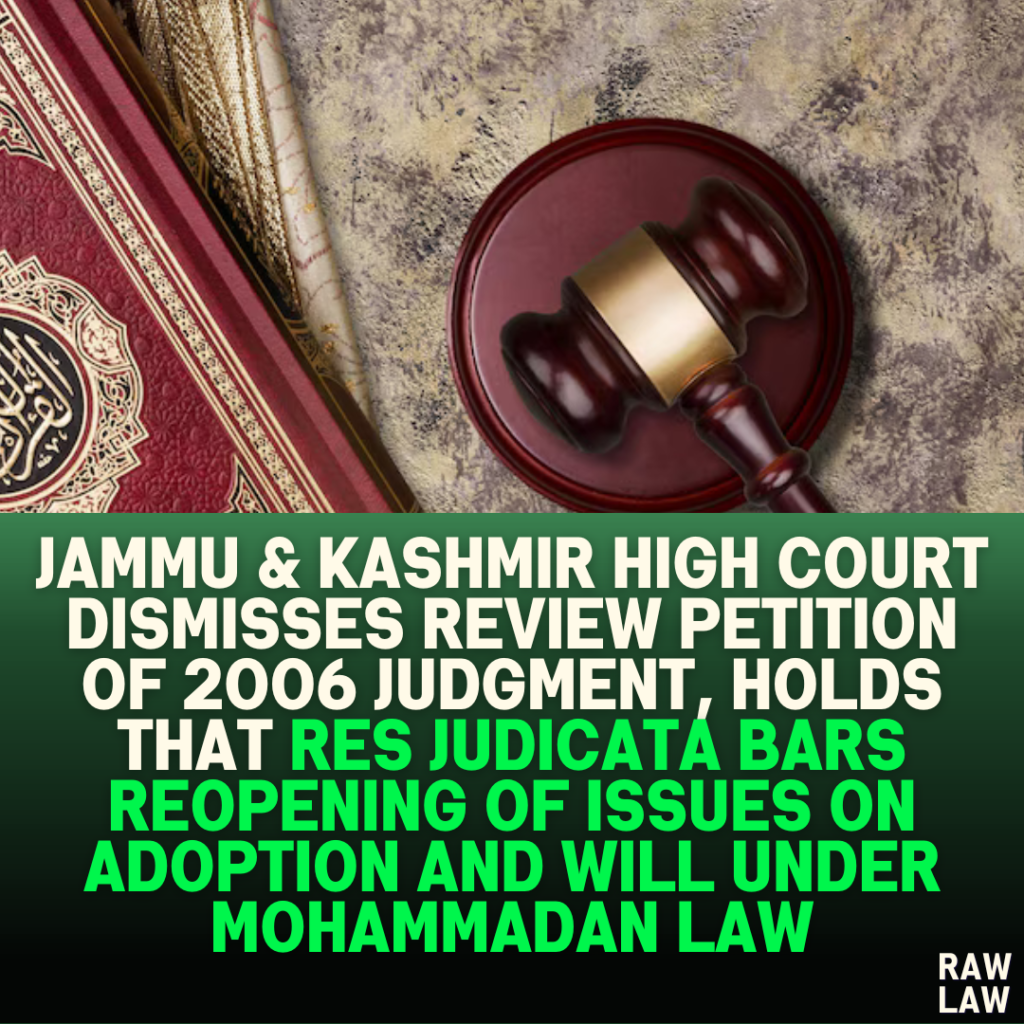Court’s Decision:
The High Court of Jammu & Kashmir at Srinagar dismissed the review petition, stating that the petitioner could not reopen issues of adoption and will under Mohammadan law that had already been decided in earlier litigation. The Court emphasized the finality of decisions from previous rounds of litigation, citing the principle of res judicata. The review petition was found to lack merit and was dismissed.
Facts:
The case revolves around a suit filed in 1966 where the plaintiff sought a declaration that he was the adopted son of one Mohammad Rather and, consequently, the owner of certain land. After a series of appeals and judgments from the trial court, the Sub Judge/CJM, and the Additional District Judge, the courts held that the plaintiff was indeed the adopted son and entitled to part of the property. However, this judgment was contested on the grounds that adoption is not recognized under Mohammadan law.
The petitioner sought a review of the 2006 judgment, which had dismissed their second appeal, arguing that both adoption and execution of a will were not permissible under Mohammadan law.
Issues:
- Whether the plaintiff could be declared the owner of the property on the basis of adoption under Mohammadan law.
- Whether the will executed in favor of the plaintiff and others was valid under Mohammadan law.
- Whether the principle of res judicata applied to prevent the reopening of these issues in the second round of litigation.
Petitioner’s Arguments:
The petitioner argued that under Mohammadan law, neither adoption nor execution of a will is legally recognized. The counsel further argued that the Jammu and Kashmir Muslim Personal Law (Shariat) Application Act, 2007, mandates that inheritance among Mohammadans must strictly follow Mohammadan principles, which the courts had overlooked in previous judgments. This, according to the petitioner, constituted an error apparent on the face of the record and warranted a review of the earlier judgment.
Respondent’s Arguments:
The respondents maintained that the issue of adoption and will had already been decided in the first round of litigation. The petitioner had failed to challenge these findings at the appropriate time and was now barred from reopening them under the principle of res judicata. The respondents argued that the adoption and will issues could not be re-agitated, as they had attained finality in the first appeal and could not be revisited in the second round of litigation.
Analysis of the Law:
The Court examined the principles of res judicata as outlined in Satyadhyan Ghosal & Ors. vs. Deorajin Debi (AIR 1960 SC 941), which prevent issues that have already been settled in earlier stages of litigation from being reopened. The Court reiterated that findings on issues such as adoption and will had been upheld in the first round of litigation and that the petitioner’s failure to contest these findings then barred them from being reopened now.
The Court also considered the applicability of the Jammu and Kashmir Muslim Personal Law (Shariat) Application Act, 2007. Since the inheritance dispute pertained to a period before the Act came into force, the provisions of the Shariat Act did not apply to the case.
Precedent Analysis:
The Court relied on the Supreme Court’s ruling in Satyadhyan Ghosal regarding res judicata. The principle was further supported by a Division Bench ruling of the Madhya Pradesh High Court in Mahant Narayandas vs. Registrar Public Trust, Bilaspur & Ors. (AIR 1979 MP 1990), which similarly restricted the re-agitation of settled issues in subsequent stages of the same litigation.
Court’s Reasoning:
The Court reasoned that since the petitioner did not challenge the trial court’s findings on adoption and will in the first round of litigation, they could not now seek to reopen the matter. The findings on these issues had attained finality and were binding. Moreover, the Court found no error apparent on the face of the record, as the petitioner’s arguments about the non-recognition of adoption and will under Mohammadan law had already been considered and rejected in the earlier judgment.
The contention regarding the application of the Shariat Act was dismissed on the basis that the inheritance dispute had arisen before the Act came into force, and therefore, its provisions were not applicable.
Conclusion:
The review petition was dismissed, and the Court held that the principle of res judicata barred the petitioner from reopening issues that had already been decided. The Court found no merit in the petitioner’s arguments regarding the applicability of the Shariat Act and reiterated that the findings on adoption and will were final.
Implications:
This ruling reaffirms the finality of judicial findings when issues have not been challenged at the appropriate stage. It highlights the application of the principle of res judicata to prevent parties from re-agitating matters that have been conclusively decided. The decision also underscores that the Jammu and Kashmir Muslim Personal Law (Shariat) Application Act, 2007, does not have retrospective application to inheritance disputes that predate its enactment.
